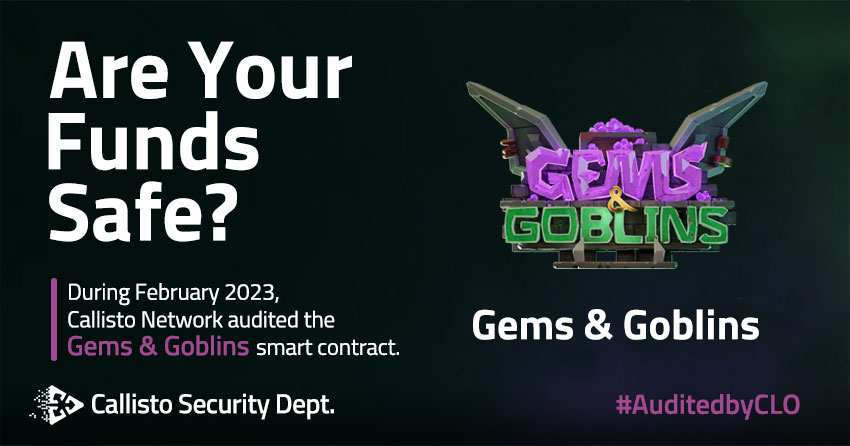Gems & Goblins Token Smart Contract Security Audit Report
Are Your Funds Safe?
Our expert team at Callisto Network has conducted an in-depth security audit of the Gems & Goblins Token smart contract. This audit aims to ensure the security of your funds by identifying and assessing any potential vulnerabilities. Here, we present our findings:
Executive Summary
This report presents the results of the security audit conducted by the Callisto Network Security Department on the Gems And Goblins ICO smart contract in February 2023. It analyzes the contract’s security posture in-depth and highlights any identified vulnerabilities.
1. Scope of the Audit
Commit f50556c44a6971462d122b0494311398556f3502
2. Audit Findings
Our audit reported a total of 1 finding(s), categorized as follows:
- 0 high-severity issue(s).
- 0 medium severity issue(s).
- 1 low-severity issue(s).
In addition to these findings, our audit identified 7 additional points, detailed in the following sections:
- 2 note(s).
- 5 owner privilege(s).
2.1 The Minimal Deposit Value Is Set In 1 Token
2.2 Use SafeTransfer Functions Instead of ERC20/223
2.3 Owner Privileges
2.4 Follow Good Coding Practice
3. Security Practices
4. Conclusion
The audited smart contract can be deployed. Only low severity issues were found during the audit.
Users should be aware of unlimited owner’s rights that can destroy the entire ICO process.
It is recommended to adhere to the security practices described in pt. 4 of this report to ensure the contract’s operability and prevent any issues that are not directly related to the code of this smart contract.
About Callisto Network
Founded by Dexaran, co-founder of Ethereum Classic, Callisto Network is a blockchain platform that prioritizes security. We’ve conducted over 330 smart contract audits across platforms like Ethereum, Ethereum Classic, and EOS. In addition to our audits, we’ve developed the ERC 223 token standard and CallistoNFT standard, enhancements over existing standards that address flaws and offer new capabilities, further establishing us as industry leaders in crypto-security.








